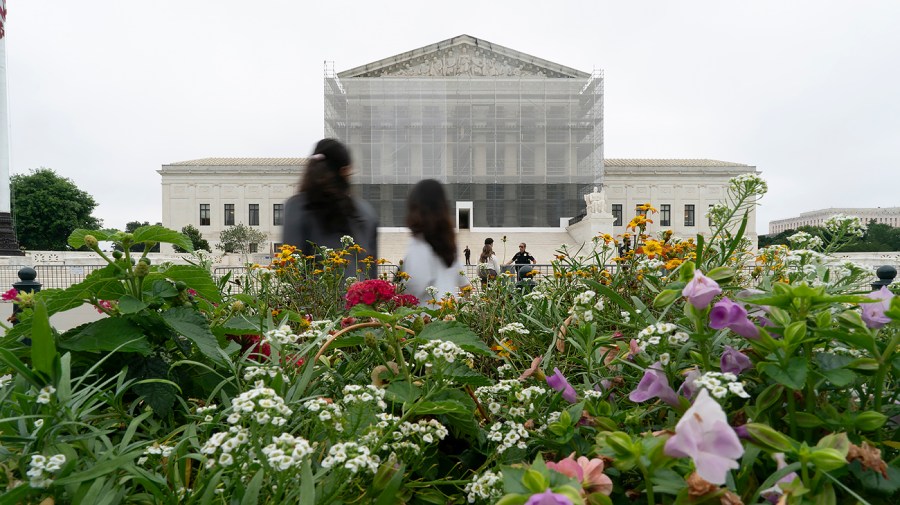The Supreme Court’s recent decision on a case concerning birthright citizenship has delivered a significant blow to those challenging former President Donald Trump’s policies. By limiting the use of nationwide injunctions, the court has effectively curtailed a powerful legal tool that prevented the implementation of certain executive orders across the United States. This ruling, issued on Friday, instructs lower courts to narrow their injunctions, potentially allowing Trump to enforce his controversial birthright citizenship policy in states not involved in the lawsuit.
The ruling, while not addressing the merits of Trump’s policy directly, signals a shift in judicial strategy that could have far-reaching implications for current and future legal challenges against executive actions. In a press conference shortly after the decision, Trump expressed optimism, listing other policies he hopes will benefit from similar judicial treatment.
Implications of the Supreme Court’s Decision
The Supreme Court’s ruling has been met with mixed reactions. Republicans have celebrated the decision, viewing it as a victory against what they perceive as judicial overreach by lower courts. Democrats, however, argue that the increase in nationwide injunctions is a necessary response to the legality of Trump’s policies, many of which were enacted through executive orders.
Legal experts, like Joyce Vance, a former U.S. attorney, have noted the ruling’s impact on the legal landscape. Vance remarked,
“The decision signals the loss of one of the best tools lawyers have had in their arsenal for dealing with this administration’s constitutional excesses.”
This sentiment reflects a broader concern among those who have relied on nationwide injunctions to halt policies deemed unconstitutional.
The Role of Nationwide Injunctions in Legal Battles
Nationwide injunctions have been a contentious topic, particularly since the start of Trump’s presidency. These court orders have been instrumental in blocking policies such as the travel ban and restrictions on transgender military service. However, the Supreme Court’s recent decision urges lower courts to reserve such measures for cases where they are the only means to provide complete relief.
This development is likely to push litigants toward class-action lawsuits, a more complex and time-consuming legal strategy. Tianna Mays, legal director at Democracy Defenders Action, acknowledged the setback but emphasized the need to adapt.
“We just have to recalibrate,”
she said, highlighting the broad impact of many Trump-era policies.
Challenges of Pursuing Class-Action Lawsuits
Class-action suits, while a potential alternative, face their own set of challenges. Legal requirements for these suits are stringent, necessitating commonality among plaintiffs and representative lead plaintiffs. Ankush Khardori, a former federal prosecutor, criticized the Supreme Court’s suggestion that class actions are an adequate substitute for nationwide injunctions.
“It’s become much harder to file class actions in recent years,”
Khardori noted, pointing to the court’s history of making class actions more difficult to pursue.
Despite these hurdles, attorneys involved in the birthright citizenship case have already filed for class-action consideration. The decision to limit nationwide injunctions is likely to reshape the legal strategies employed by those challenging executive actions.
Historical Context and Future Implications
The use of nationwide injunctions has been a point of contention for years, with critics arguing that they allow district court judges to exert disproportionate influence over national policy. However, supporters contend that these injunctions are crucial for preventing unconstitutional actions from taking effect.
Justice Amy Coney Barrett, writing for the majority, emphasized the need for judicial restraint.
“When a court concludes that the Executive Branch has acted unlawfully, the answer is not for the court to exceed its power, too,”
she wrote. In contrast, Justice Sonia Sotomayor’s dissent accused the majority of succumbing to the Trump administration’s strategic maneuvering.
The Supreme Court’s decision to bar the implementation of Trump’s birthright citizenship order for 30 days leaves the future of the policy uncertain. Legal experts like Khardori have criticized the court for failing to consider the practical implications of its ruling.
As the legal community grapples with the ramifications of this decision, the debate over the appropriate use of nationwide injunctions is likely to continue. Tianna Mays cautioned that the ruling could have unintended consequences for both sides of the political spectrum.
“It cuts both ways,”
she remarked, noting that similar injunctions have also been used to block policies under President Biden.
In the wake of this landmark decision, the legal strategies employed by those challenging executive actions will need to evolve. While the path forward may be more complex, the commitment to upholding constitutional principles remains steadfast.
